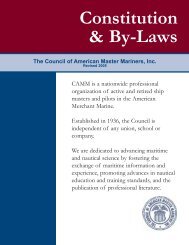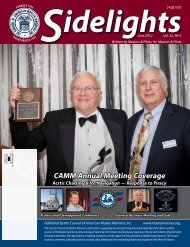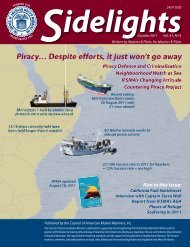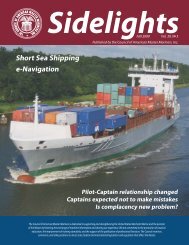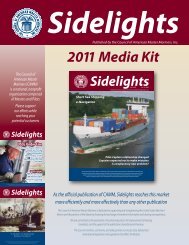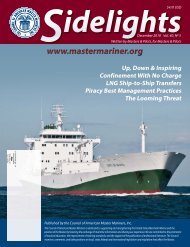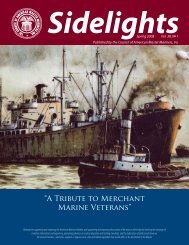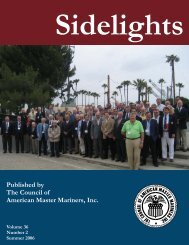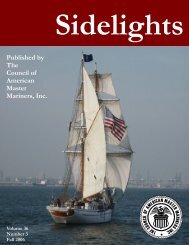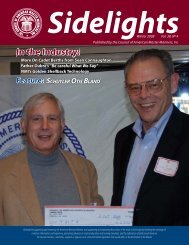Membership In the - Council of American Master Mariners
Membership In the - Council of American Master Mariners
Membership In the - Council of American Master Mariners
Create successful ePaper yourself
Turn your PDF publications into a flip-book with our unique Google optimized e-Paper software.
just form a posse and grab people <strong>of</strong>f <strong>the</strong><br />
street.” The last thing you want to do is<br />
have a company that is sending people<br />
out <strong>the</strong>re who are not trained and we<br />
have an incident that would put a bad<br />
name on <strong>the</strong> maritime community.<br />
Andersen: There has been a lot <strong>of</strong> talk<br />
that this is such a small slice <strong>of</strong> <strong>the</strong> pie<br />
<strong>of</strong> global commerce, so is it cost effective<br />
to send multi-million-dollar warships<br />
out just <strong>the</strong>re to fight <strong>the</strong> pirates?<br />
McKnight: I think it is. I think that<br />
every nation that is out <strong>the</strong>re has a<br />
concern for <strong>the</strong> free flow <strong>of</strong> commerce<br />
around <strong>the</strong> world. <strong>In</strong> 2012 and beyond,<br />
<strong>the</strong> world is going to get flatter; it is not<br />
just <strong>the</strong> European Union or ano<strong>the</strong>r<br />
group that are <strong>the</strong> only ones trading. For<br />
<strong>the</strong> U.S. Navy, one <strong>of</strong> our key missions is<br />
<strong>the</strong> free flow <strong>of</strong> commerce. With piracy,<br />
if we don’t have enough ships we have to<br />
figure how to have <strong>the</strong> right assets out<br />
Book Releases<br />
A Sailor on Horseback<br />
or a Rolling Stone—<br />
Memoirs <strong>of</strong> Captain<br />
Robert T. Bush, FNI<br />
A Sailor on Horseback is a memoir<br />
<strong>of</strong> a life spent on and around <strong>the</strong> sea.<br />
Beginning with a recollection <strong>of</strong> rural life<br />
in pre-war England, with World War II seen<br />
through <strong>the</strong> eyes <strong>of</strong> a schoolboy during <strong>the</strong> ‘Occupation’,<br />
<strong>the</strong> book spans eighty years and all <strong>the</strong> world’s oceans. The<br />
many strands <strong>of</strong> <strong>the</strong> memoir include nautical nostalgia,<br />
recalling seafaring in <strong>the</strong> immediate post-war era before<br />
<strong>the</strong> decline <strong>of</strong> <strong>the</strong> former colonial powers and <strong>the</strong> traditional<br />
shipping companies – trading around <strong>the</strong> <strong>In</strong>dian<br />
Ocean coasts, and in Burmese waters before <strong>the</strong> military<br />
government became established – Iran before Mossadeq<br />
and after – Saudi Arabia and <strong>the</strong> Persian Gulf in boom<br />
times and war times – happy days ashore and afloat in<br />
Australia, Canada, Mexico and <strong>the</strong> Seychelles – adventurous<br />
and exciting times working for <strong>the</strong> world’s richest man<br />
– yachting deluxe on a superyacht, meeting many remarkable<br />
people in some beautiful places – good and not so<br />
good times in <strong>the</strong> shipping industry around <strong>the</strong> world.<br />
Available in hardcover, paperback, and for download.<br />
<strong>the</strong>re to protect that free flow.<br />
Admiral (Michael) Mullen, when he<br />
was chief <strong>of</strong> naval operations, talked<br />
about <strong>the</strong> 1,000-ship navy and everybody<br />
in Congress thought, “Oh my God,<br />
we can’t afford a thousand ships.” What<br />
he was talking about was all <strong>the</strong>se navies,<br />
<strong>the</strong> 1,000 ships were all <strong>the</strong>se coalitions<br />
working toge<strong>the</strong>r to protect commerce<br />
wherever it is. We just don’t have <strong>the</strong><br />
resources alone, ships are more expensive;<br />
we have to operate at extended<br />
ranges. The more we work toge<strong>the</strong>r and<br />
cooperate as coalition forces, <strong>the</strong> better<br />
<strong>of</strong>f we are going to be. <br />
Will Watson, CAMM Associate Member<br />
since 2009 and current president <strong>of</strong><br />
AdvanFort, submitted this interview for<br />
publication in Sidelights. Will Watson<br />
has been writing regularly for Sidelights<br />
since 2007.<br />
Cartner & Fiske, LLC<br />
Washington, D.C.<br />
Maritime, Aviation,<br />
Commercial and<br />
<strong>In</strong>ternational Taxation<br />
and Expatriation Law<br />
jacc@cfl aw.net<br />
202 429 2500<br />
Pirate Alley:<br />
Commanding Task Force<br />
151 Off Somalia<br />
Admiral Terry McKnight took command<br />
<strong>of</strong> a new multi-national task force in 2009<br />
to combat piracy in <strong>the</strong> Gulf <strong>of</strong> Aden. He<br />
directed operations that disrupted several<br />
hijackings and resulted in <strong>the</strong> capture <strong>of</strong> sixteen Somali pirates.<br />
After running head-on into a U.S. policy <strong>of</strong> catch-and-release, he<br />
realized that <strong>the</strong>re was more to fighting piracy than just catching<br />
youngsters armed with AK-47s and RPGs.<br />
McKnight retired from <strong>the</strong> Navy and began researching <strong>the</strong><br />
problem. This book, co-written with journalist Michael Hirsh,<br />
explore every aspect <strong>of</strong> Somali piracy, from how <strong>the</strong> pirates operate<br />
to how <strong>the</strong>ir actions have impacted <strong>the</strong> world economy. They<br />
examine various attempts to solve <strong>the</strong> problem, including placing<br />
armed guards aboard merchant ships, and highlight <strong>the</strong> best ways<br />
to outfit ships for travel through high risk areas.<br />
<strong>In</strong> addressing <strong>the</strong> worldwide economic impact, <strong>the</strong>y note<br />
piracy costs as much as $13 billion a year, and in 2011 took 1000<br />
seafarers into captivity. One shipping company argues that overreaching<br />
shipping regulations have a greater negative effect on <strong>the</strong><br />
economy. The book concludes <strong>the</strong> U.S. government needs to take<br />
additional measures to stop <strong>the</strong> flow <strong>of</strong> U.S. dollars for ransoms<br />
payments that serves as <strong>the</strong> only reason for piracy in <strong>the</strong> region.<br />
Available in hardcover and for download.<br />
The <strong>Council</strong> <strong>of</strong> <strong>American</strong> <strong>Master</strong> <strong>Mariners</strong>, <strong>In</strong>c. December 2012 Sidelights 17



